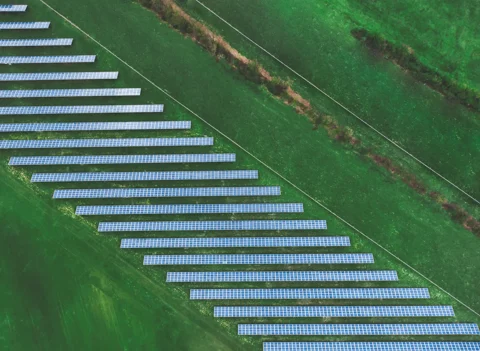Current issues related to economy, (responsible) investment, pension and income: every week an APG expert gives a clear answer to the question of the week. This time Expert Portfolio Manager Energy Transition Martijn Olthof on whether we can consider the energy crisis to be over. “I think you can only really say the energy crisis is over when there are enough sustainable alternatives available, in the form of heat, green gas and electrification.”
In January 2024, natural gas prices dipped below 27 euros per megawatt hour for the first time since July. The market proved relatively insensitive to increased tensions in the Middle East due to the war between Israel and Palestine. Europe has spent the past two years looking for alternatives to Russian natural gas, and has been successful. Here and there, then, the conclusion is already being drawn that the energy crisis is over, but is it? Olthof is somewhat less certain about that.
“When the war in Ukraine broke out, everyone panicked and prices went through the roof. We saw market phenomena that had never happened or hadn’t happened for years. But a number of developments came together, which meant that the loss of Russian natural gas supplies was not such a big problem in the end. So far, Europe has enough natural gas. Because of less consumption, but also because of the switch to alternatives - especially a lot of LNG, liquefied natural gas - and longer-term initiatives. European policies, such as the EU incentive policy for green gas, are shaping up well so far.”
Market for solar panels
However, Olthof does not think we should jump to the conclusion that it’s all over now. “In the meantime, there have also been a number of developments that have caused that behavioral change - less consumption - to slow down somewhat, and that also applies to the use of alternative forms of energy. Take the market for solar panels, for example. A year ago, you didn’t know where to get them, and you had to wait at least six months for an installer to be available. Now, if you want solar panels, someone will be at your doorstep tomorrow to put them on your roof. That market has completely collapsed, while solar panels have become extremely cheap. Also, people are now insulating a lot less, and far fewer heat pumps are being installed than a year ago. Plus, new legislation is coming in that has caused a lot of major district heating projects to be halted by investors. All in all, the high sense of urgency of a year ago does seem to have diminished somewhat.”
Tenfold natural gas price
At the time of writing, the natural gas price is around 30 euros per megawatt hour. To demonstrate the relativity of that level, Olthof grabs the price chart for the past thirteen years. “The current natural gas price is still substantially higher than before the war in Ukraine, but far from the exorbitantly high level of late 2022, when the price was tenfold. And in the years after 2015, although the low oil price pushed it toward 15 euros and briefly to 10 euros at the beginning of the Covid crisis, between 2011 and 2015 the natural gas price always fluctuated around 30-40 euros. And no one was talking about a crisis at that time.”
So, for now, calm seems to have returned to the natural gas market for a while. But to be able to rule out a crisis for the longer term, Olthof says more insight is needed into sufficient natural gas supply as well as sufficient backup for when part of that supply is lost.
LNG through the roof
“Supplies were well stocked for this winter and October was warm, so then you don’t need much natural gas. But that's no use if it's all different next winter. The current dynamics of supply and demand are working. But the LNG market can go through the roof tremendously all at once, if some supply is lost here and there or if there is a prolonged cold spell. In that sense, the crisis continues, because we are not yet 100 percent sure that there are enough alternative, perhaps more expensive energy sources available to get through such a situation. As long as you are still dependent on natural gas, you have to be able to tap into enough, diverse sources for that and bring it here. For that, the LNG market will have to mature. There will have to be more suppliers and volumes will have to increase. The market for LNG is still very tight right now.”
In addition to this security of supply crisis, there is also the climate crisis, Olthof continues. “Eventually we will have to get away from natural gas anyway. I think you can therefore only really say that the energy crisis is over when there are enough sustainable alternatives available, in the form of heat, green gas, electrification et cetera. That transition will not be fully realized before 2040. We will still need natural gas until 2040-2050, from wherever we can get it.”



